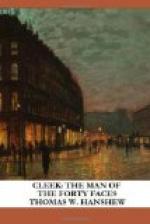“There’s not a finger-print in the lot that is worth anything as a means of identification, Miss Lorne,” he said. “But you and Lady Chepstow may accept my assurance that Captain Hawksley is not the man. The writer of this letter belongs to the criminal classes; he is on his guard against the danger of finger-prints, and he wore rubber gloves when he penned this message. When I find him, rest assured I shall find a man who has had dealings with the police before and whose finger-prints are on their records. I don’t know what his game is nor what he’s after yet, but I will inside of a week. I’ve an idea; but it’s so wild a thing I’m almost afraid to trust myself to believe it possible until I stumble over something that points the same way. Now, go home with Lady Chepstow, and begin the work of helping me.”
“Helping you? Oh, Mr. Cleek, can we? Is there anything we can do to help?”
“Yes. When you leave the house, act as though you are in the utmost state of dejection—and keep that up indefinitely. Make it appear, for I am certain you will be followed and spied upon, as if I had declined the case. But don’t have any fear about the boy. The two constables will sleep in the room with him to-night and every night until the thing is cleared up and the danger past. To-morrow about dusk, however, you, personally, take him for a walk near the Park, and if, among the other Cingalese you may meet, you should see one dressed as an Englishman, and wearing a scarlet flower in his buttonhole, take no notice of how often you see him nor of what he may do.”
“It will be you, Mr. Cleek?”
“Yes. Now go, please; and don’t forget to act as if you and her ladyship were utterly broken-hearted. Also”—his voice dropped lower, his hand met her hand, and in the darkness of the hall a little silver-plated revolver was slipped into her palm—“also, take this. Keep it always with you, never be without it night or day, and if any living creature offers you violence, shoot him down as you would a mad dog. Good-night, and—remember!”
And long after she and Lady Chepstow had gone down and passed out into the night he stood there, looking the situation straight in the face and thinking his own troubled thoughts.
“A wedding bouquet! A threat against her, and the mention of a wedding bouquet!” he said, as he went back into the room and sat down to figure the puzzle out. “Only one creature in the world knows of my feelings in that direction, and only one creature in the world would be capable of that threat—Margot! But what interest could she or any of her tribe have in the death of Lady Chepstow’s little son? Her game is always money. If she were after a ransom she would try to abduct the child, not to kill him, and if”—A sudden thought came and wrenched away his voice. He sat a moment twisting his fingers one through the other and frowning at the floor; then, of a sudden, he gave a cry and jumped to his feet. “Five lacs of rupees—a fortune! By George, I’ve got it!” he fairly shouted. “The wild guess was a correct one, I’ll stake my life. Let’s put it to the test.”




